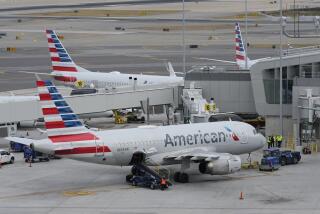Taking Flier on Insurance for Air Baggage
- Share via
When I flew home from Europe,” says a Boston lawyer, “they couldn’t find the little bag that held everything I’d bought abroad--the Vuarnet and Ted Lapidus sunglasses, the Shetland sweaters, lambskin hats and scarves from Paris that cost $40 there and would be $100 here, and lots and lots of French perfumes.
“But they said don’t worry, and indeed, next day, they brought the bag to my apartment. All it contained was the cellophane wrapper from the Chanel and a bottle of perfume the thief didn’t like . . . justifiably. This was a thief with impeccable taste.”
Airlines, or course, are liable for loss, delay or damage to baggage, usually stating the limit of their liability on the back of the ticket--by federal regulation not lower than $1,250 per passenger on domestic flights. Airlines also may exclude certain “fragile, valuable or perishable articles”--jewelry, cameras, even the dishes one couple brought back from England, broken en rOute. “They said they weren’t liable,” says the man, “because the dishes were fragile. What does fragile mean? If it breaks, they said, it’s fragile.”
Coverage is neither instant nor automatic. If the whole bag is missing, one must wait several months in case the airlines’ complex system of baggage tracing eventually spits it out. The traveler also must list missing contents honestly (remembering, says a spokesman for the U.S. Department of Transportation, that “the bag may suddenly be found, and the airlines will certainly look through it themselves”), and provide sales receipts--usually available only for goods just purchased.
Older possessions usually are assigned depreciated values, and goods bought abroad their foreign value. The tourist above got exactly the $300 she’d spent for the stolen goods, “though they’d cost $900 if I replaced them all here,” she says. (Apparently sympathetic with this argument, the airline gave her and her sons another $200 apiece for their inconvenience.)
Actually, she had further recourse, having charged the tickets on American Express, which has discovered, as its ads say, that people can’t “get the most out of a trip when you’re worrying about the fate of your suitcases.” Since 1983, all its U.S. card holders get baggage insurance free (well, for 29 cents of their annual membership fee) when they charge a trip, covering baggage checked or carried on a common carrier, or lost, stolen or damaged en route to a terminal (via public carrier again) or in the terminal itself.
But American Express (and its copiers, most recently the Diners Club corporate card) has its limits. On checked baggage, this is “excess coverage”: American Express considers claims only after the responsible carrier has paid, only “supplements” that payment “up to the baggage’s full (claimed) value, or $500, whichever is lower,” and pays nothing if the carrier has denied the claim.
Even good old homeowners insurance may apply, given its usual promise to cover certain losses away from home. Baggage, like the home’s contents, only is covered for “named perils,” however--fire, wind, ice and snow, water damage, theft--and suitcases that leave New York and never arrive in Denver may not qualify. There would have to be indication of “probable theft, like somebody broke into it,” says State Farm Insurance spokesman Dave Hurst.
In practice, “we take a liberal position,” says Pete Ryan, staff claims director at Fireman’s Fund Insurance. “If a bag doesn’t show up in a reasonable time, we’ve been paying the claims.” This may change: A New York court recently upheld a carrier for denying such a claim, noting that mere non-delivery of checked luggage doesn’t necessarily indicate theft.
Homeowner’s insurance, moreover, like American Express, only pays after the carrier has paid. And perhaps the more people offer baggage insurance, the more they’re likely to haggle about who should pay first, and how much . . .
More to Read
Sign up for The Wild
We’ll help you find the best places to hike, bike and run, as well as the perfect silent spots for meditation and yoga.
You may occasionally receive promotional content from the Los Angeles Times.






